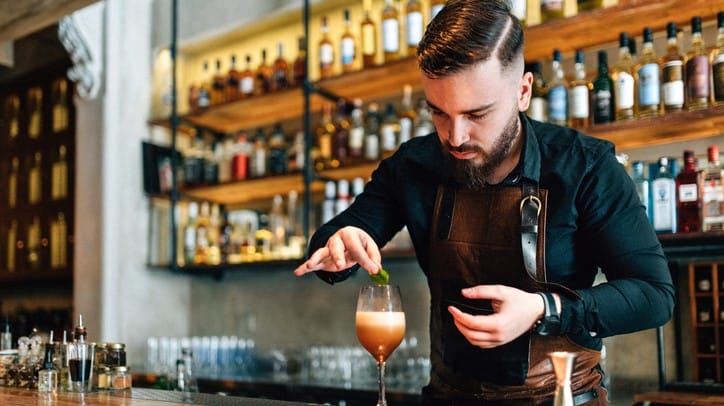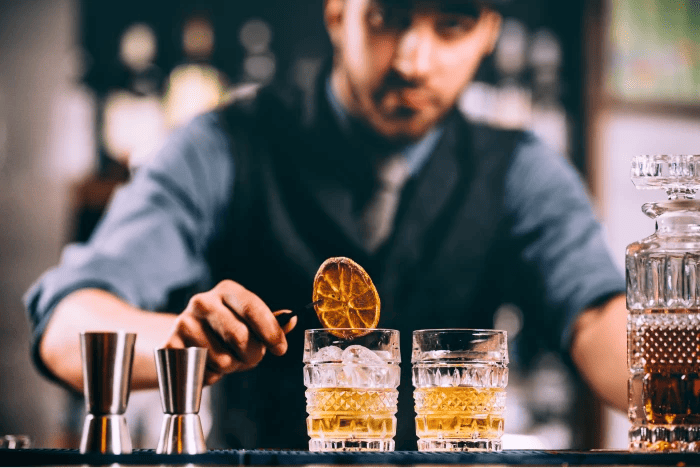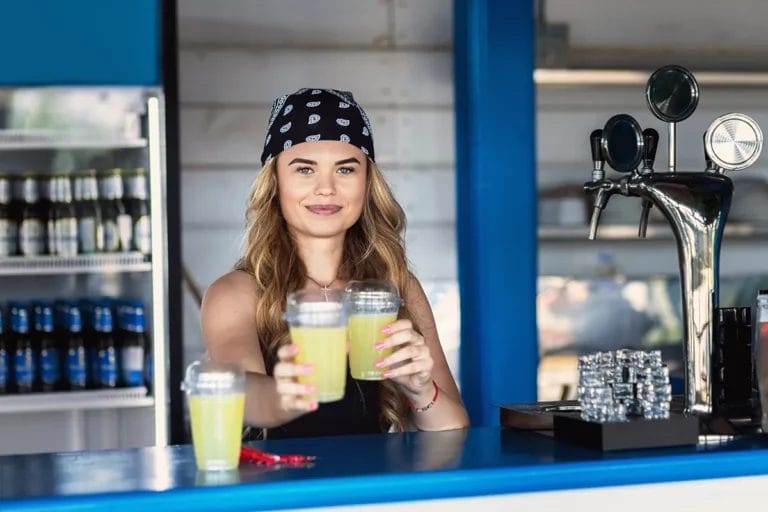The “Risks and Realities of Working in the Alcohol Business” webinar brought industry experts together to discuss the complexities and practicalities of starting, growing, and protecting alcohol-related businesses.
This in-depth discussion is an asset for mobile bar operators, caterers, event managers, bartenders, and anyone else who works in the alcoholic beverage industry.
Our expert panelists include:
- Sarah Murphy, the CEO and lead educator at Mobile Bev. Pros
- Kyle Porter, the moderator from Insurance Canopy
- Daniel Steadman, VP of Underwriting at Insurance Canopy, specializing in insurance for small businesses
Throughout the webinar, the panelists guided attendees through the stages of building and safeguarding an alcohol business, sharing insider knowledge, best practices, and personal anecdotes from their experiences in the industry.
Starting Your Business
One of the biggest challenges new alcohol-related business owners face is navigating the regulatory landscape. Sarah stressed the importance of understanding the difference between serving and selling alcohol, stating, “In most states, selling alcohol requires a liquor license, but serving it does not necessarily need one.”
However, it’s vital to remember that every state — and sometimes every county or city — has unique regulations. She advised business owners to “call your state’s regulatory board and speak in hypotheticals when asking about legal requirements. Never give them more information than they need.”
From a structural standpoint, Sarah also encouraged new businesses to form LLCs. “If you’re serving alcohol and you’re not an LLC, rethink that choice. An LLC separates your personal assets from your business liabilities — if something happens, your house isn’t on the line,” she explained.

Growing Your Business
As your business begins to take off, growing it is the next challenge. According to Sarah, “One of the biggest barriers to growth is simply not being loud enough.” She explained that many businesses stagnate because owners don’t aggressively market themselves.
Actively marketing your business means following up with leads and being present in your industry.
If someone reaches out, they need your service, so it’s your job to ensure they have all the information they need to make a decision. Don't let silence be your answer.
Sarah Murphy
Though digital marketing is an option, Sarah emphasized the importance of building relationships within one’s community. “The fastest way to grow your business is to grow your network,” she said.
Rather than focusing solely on SEO and social media, she recommended connecting with “amplifiers” — people in one’s community who interact with their ideal clients, such as wedding planners or event coordinators. “Instead of meeting a hundred brides, build a relationship with one top-tier wedding planner. They already have access to your ideal clients,” she pointed out.
In addition, Sarah urged businesses to focus on creating a unique brand. “It’s not about making the best cocktail; it’s about creating a brand that resonates with people. People do business with people they like and trust,” she said.

Protecting Your Business
Protecting an alcohol-related business from risk is crucial, and Daniel Steadman provided in-depth insight into the essential insurance policies needed for this industry.
“At a bare minimum, every business should have general liability insurance,” said Daniel. This covers issues like slip-and-fall incidents or property damage. He explained that this is especially critical for mobile businesses that travel to different locations.
Daniel also highlighted the importance of liquor liability insurance for businesses selling or serving alcohol.
If you’re in the business of selling alcohol, your general liability policy won’t cover alcohol-related claims. You need a separate liquor liability policy for that.
Daniel Steadman
Liquor liability insurance protects against claims related to alcohol, such as overserving a customer who later causes damage or harm.
Product liability insurance is another must-have for businesses providing food and drink. “Product liability covers your products if they cause harm — like if someone gets food poisoning from a catered event,” Daniel explained.

Sarah Murphy added to this by advising businesses to implement strict internal policies for serving alcohol. “No shots, no doubles, and everyone gets carded,” she recommended. “It’s not just about following the law — it’s about protecting your business from unnecessary risk.”
Another risk factor emerging in the alcohol business is the rise of THC-infused beverages. Sarah advised against serving these alongside alcohol, although every state has different laws about this.
The combination of THC and alcohol throws everything you know about responsible serving out the window. You’re better off steering clear of serving both at the same time.
Sarah Murphy
Daniel agreed, noting that many insurance policies don’t cover cannabis-related incidents, even if it’s legal in your state. “Always check your policy for exclusions, especially when dealing with products like THC,” he advised.
Key Takeaways
The “Risks and Realities of Working in the Alcohol Business” webinar provided valuable insights for anyone looking to start, grow, and protect their alcohol-related business. From understanding complex state regulations to marketing effectively and securing the right insurance policies, the panelists provided guidance and actionable steps to ensure your business thrives.
Here are the key takeaways:
- Starting a business: Thoroughly research local liquor laws, structure your business as an LLC to protect your assets, and focus on building a flexible, adaptable business.
- Growing a business: Leverage relationships in your community and create a brand that resonates with people. Don’t rely solely on digital marketing — focus on building your network and connecting with amplifiers.
- Protecting a business: Secure the proper insurance, including general liability, liquor liability, and product liability policies. Establish strict serving policies, and be cautious when it comes to unique situations like self-service bars and THC beverages.
This discussion emphasized that while the alcohol business can be profitable and enjoyable, it is also highly regulated and carries unique risks. With equal parts preparation and protection, you can build a successful business in this thriving industry.





